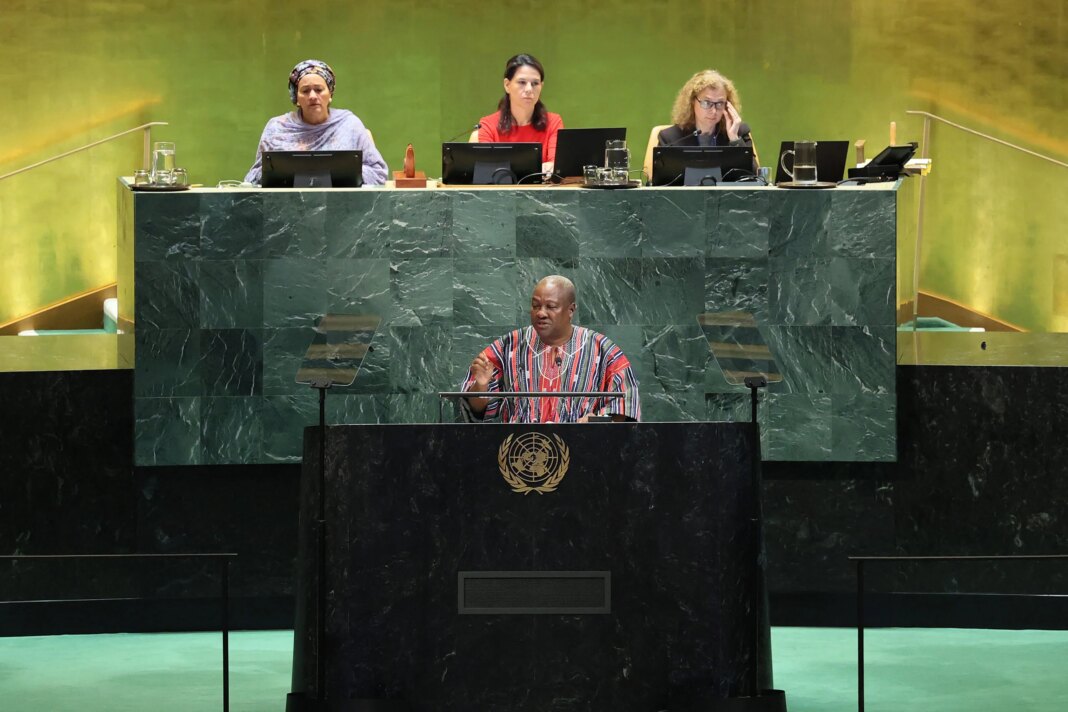For centuries, the transatlantic slave trade has been treated as history—a horrific chapter to be memorialized but not rectified. Last week at the United Nations General Assembly, Ghana’s president, John Dramani Mahama, challenged this narrative, calling the trade “the greatest crime against humanity” and advocating for reparations on behalf of Africans and their descendants worldwide.
Mahama’s announcement to submit the first formal motion calling for reparative justice through a global body is a significant step towards acknowledging historical wrongs. The proposal urges the international community to support a framework of U.N.-endorsed compensation for centuries of stolen labor, wealth extraction, and generational harm inflicted on Africans and their descendants. For Black Americans, this initiative could serve as a watershed moment, strengthening calls for recognition and material redress within the U.S.
“Reparatory justice is not about pity,” Mahama emphasized, as reported by Capital B News. “It is about recognition, responsibility, and restitution. The descendants of Africa deserve the dignity of acknowledgment and the fairness of redress.” This statement underscores the urgency of addressing historical injustices that have persisted over generations.
Supporting Mahama’s stance, the Central African Republic and Latin American allies like Bolivia highlighted the need for financial restitution, environmental restoration, and the restitution of cultural heritage. “We demand reparations for the enslavement of our people and the colonization of our land that resulted in the theft of natural resources, as well as the looting of artifacts and other items of cultural heritage that have yet to be returned in total,” Mahama added, amplifying the collective voice of nations impacted by colonial exploitation.
Mahama highlighted a profound historical hypocrisy: Western governments compensated enslavers for their so-called “losses” after abolition but never provided reparations to the enslaved or their descendants. This injustice has compounded over generations, perpetuating a racial wealth gap and systemic inequities pervasive in housing, education, and healthcare today.
On social media, a chorus of voices from the Black community echoed the sentiment that this overdue conversation is not just necessary but vital. Users expressed their outrage over the ongoing denial of a formal acknowledgment of the transatlantic slave trade’s atrocities. One user articulated the absurdity of failing to recognize such a monumental crime against humanity officially in modern discourse.
Attorney Ben Crump also weighed in, emphasizing that “it’s past time the world delivers true justice for our stolen ancestors.” The growing momentum behind reparations has sparked a renewed commitment to justice and accountability across the African diaspora.
The call for reparations is framed around three core pillars: direct financial compensation, environmental restoration for exploited Black communities, and the return of cultural property looted during colonization. These demands challenge the prevailing notion that slavery is a closed chapter, insisting instead that its ramifications are intricately woven into the structural realities that Black individuals face today.
Mahama’s reiteration of these demands frames a narrative of reclamation: “We must demand reparations for the enslavement of our people and the colonization of our land that resulted in the theft of natural resources.” By emphasizing the historical and ongoing implications of these injustices, the discourse surrounding reparations is positioned as a critical component of contemporary human rights advocacy.
Historically, Western nations, especially the U.S., have blocked reparations measures at the United Nations. The success of Ghana’s proposal is contingent on garnering support from non-African nations as well. Ultimately, Ghana’s leadership, bolstered by alliances in Africa and Latin America, reframes reparations as a universal human rights issue, compelling the world to grapple with the larger implications of unaddressed historical crimes. The question posed remains: if the greatest crime against humanity has never been repaired, what limitations does that reveal about the systems we rely on to deliver justice?



